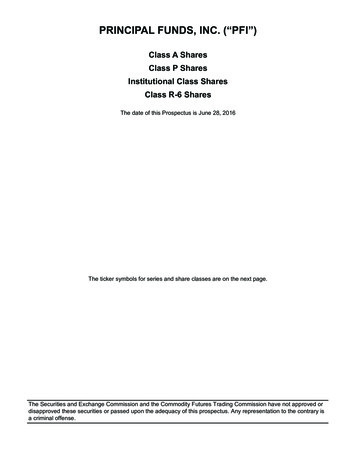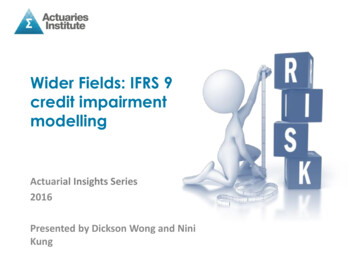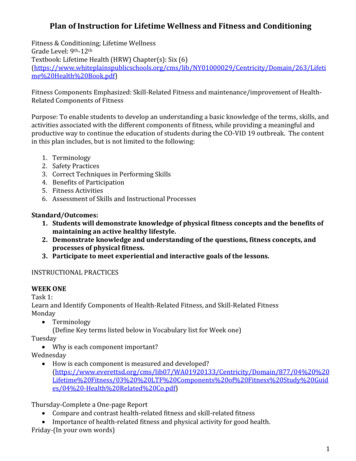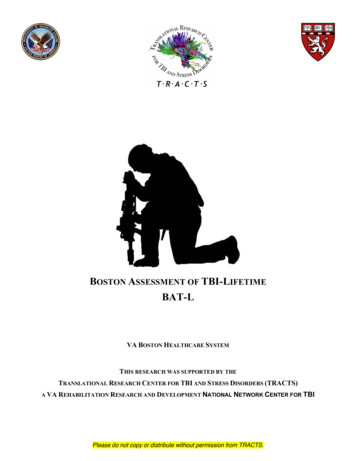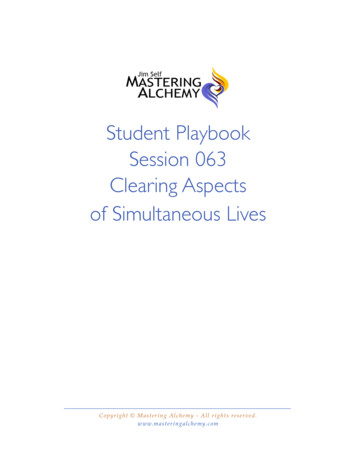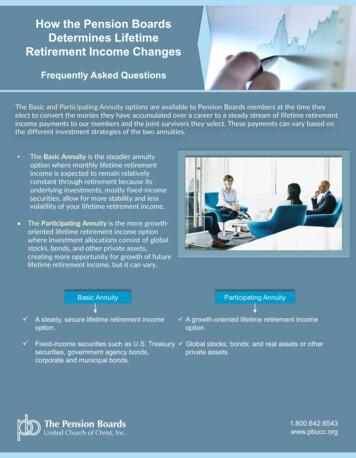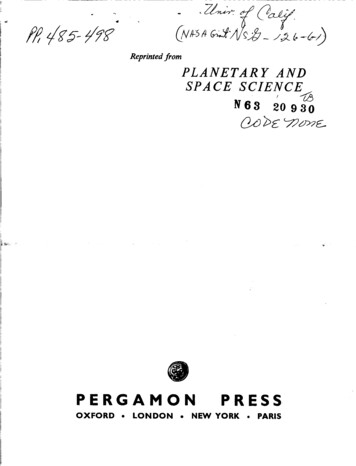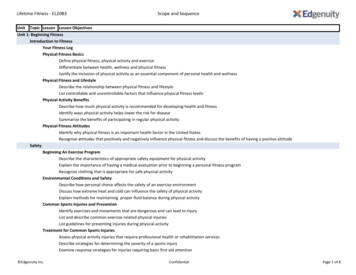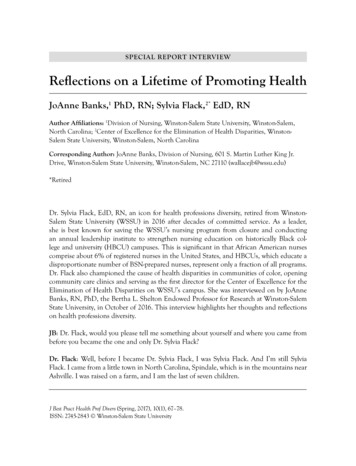
Transcription
SPECIAL REPORT INTERVIEWRefections on a Lifetime of Promoting HealthJoAnne Banks,1 PhD, RN; Sylvia Flack,2* EdD, RNAuthor Affliations: 1Division of Nursing, Winston-Salem State University, Winston-Salem,North Carolina; 2Center of Excellence for the Elimination of Health Disparities, WinstonSalem State University, Winston-Salem, North CarolinaCorresponding Author: JoAnne Banks, Division of Nursing, 601 S. Martin Luther King Jr.Drive, Winston-Salem State University, Winston-Salem, NC 27110 (wallacejb@wssu.edu)*RetiredDr. Sylvia Flack, EdD, RN, an icon for health professions diversity, retired from WinstonSalem State University (WSSU) in 2016 after decades of committed service. As a leader,she is best known for saving the WSSU’s nursing program from closure and conductingan annual leadership institute to strengthen nursing education on historically Black college and university (HBCU) campuses. This is signifcant in that African American nursescomprise about 6% of registered nurses in the United States, and HBCUs, which educate adisproportionate number of BSN-prepared nurses, represent only a fraction of all programs.Dr. Flack also championed the cause of health disparities in communities of color, openingcommunity care clinics and serving as the frst director for the Center of Excellence for theElimination of Health Disparities on WSSU’s campus. She was interviewed on by JoAnneBanks, RN, PhD, the Bertha L. Shelton Endowed Professor for Research at Winston-SalemState University, in October of 2016. This interview highlights her thoughts and refectionson health professions diversity.JB: Dr. Flack, would you please tell me something about yourself and where you came frombefore you became the one and only Dr. Sylvia Flack?Dr. Flack: Well, before I became Dr. Sylvia Flack, I was Sylvia Flack. And I’m still SylviaFlack. I came from a little town in North Carolina, Spindale, which is in the mountains nearAshville. I was raised on a farm, and I am the last of seven children.J Best Pract Health Prof Divers (Spring, 2017), 10(1), 67–78.ISSN: 2745-2843 Winston-Salem State University
68J Best Pract Health Prof Divers: Vol. 10, No. 1, Spring 2017I had a wonderful upbringing. I had the best parents in the world—I really did. They believed in education. My mother, my parents were pro-education advocates, even at that time.They sought out the best educational opportunities for me. It was exciting to be accepted tothe nursing program Winston-Salem State University. My mother was out in the communitydrumming up fnancial aid for me every place and any place that she could. My dad workedas an orderly at the local hospital. He was instrumental in arranging for me to work there inthe summer before entering WSSU. Of course, I could only work as a maid at that time. Butthat experience shaped my desire to excel in nursing and health care.JB: Historically, African Americans have been underrepresented in the health professions.What do you see as the major reason for that? And what do you see as the most importantthing in terms of changing that?Dr. Flack: I’ve been in health care and health education for more years than I want to tellyou. In 2018, it will be 50 years.JB: Oh, praise God!Dr. Flack: Yeah. And the truth is, Dr. Banks, that there hasn’t been much change related toAfrican Americans except for the fact that we can get into educational programs much easierthan during my education. You know, at the time I started, African Americans could onlyattend historically Black institutions. Now, there were a few people, a few of my teachers, forexample, that managed to get a master’s from the University of Chapel Hill. Some of theaspects that changed I think have helped us, but not enough. The fact that it is recognizedthat the nation has problems such as disparities in health and health care especially for ethnicand racial groups has presented opportunities for these groups to seek health care professions.And so, every now and then when that disparity issue becomes politically hot, you see moremoney directed toward African Americans, Hispanics, American Indians, and Asians to prepare themselves to go into health care felds. Certainly, I believe that we do not face as manybiases as we used to, but they’re still there. An example: until 1967 students from the WSSUnursing program were not allowed to train at Baptist or Forsyth [Hospital]. My class was thefrst class to train at Baptist. During my time as dean from 1989 to 2004 we had no troubleusing facilities in this area for clinical. However, facing criticism and intense scrutiny, the faculty and students had to work hard to maintain an outstanding reputation in these facilities.JB: So, now that some things have changed, what do you feel is the role of HBCUs andminority-serving institutions [MSIs] in terms of increasing the diversity in health professions?Do you see them as still being relevant?
Promoting Health Equity69Dr. Flack: Well, I still think HBCUs are graduating more health care professionals, mainlyfrom nursing. Very few HBCUs and MSIs have the variety of health programs at WinstonSalem State University. In terms of the HBCU, health care programs can really become aplus. A mission to produce health care providers can offer HBCUs the uniqueness that isneeded to resist the attempts to close these schools. When I joined WSSU I recommendedthat each department be connected in some way to programs or initiatives in health andhealth care. I could see very clearly that the number of campuses in the UNC university system could serve as a liability to the HBCUs. The board of governors was considering closingour nursing program, and if that had happened, I don’t think Winston-Salem State wouldbe as it is today, because nursing was and still is the premier program. So, I think the goal ofHBCUs should be to respond to the needs of this nation in preparing professional for jobs infelds where there are shortages, one of them being health and health care. They should startintegrating health-related programs or initiatives not only in schools of health sciences or departments of health but in other programs. It will give HBCUs uniqueness. This could allowthe political strength to resist closing and other major changes occurring in these universities.JB: I’ve been talking to people and reading the Chronicle of Higher Education and the Journalof Blacks in Higher Education. It seems like some of our health profession programs at HBCUsare really struggling right now. Do you see that as being different, say, from when you frststarted your work, or has that always been the same? And what accounts for the big strugglethat we’re having?Dr. Flack: Well, there’s a lot. We struggled. I came here kicking and screaming. I didn’t meanto come back home, but there was something, a higher power, that said, “You’re going.” I hada choice between West Virginia and Winston-Salem. My son, who was a teenager, looked inmy eyes and said, “Please don’t take me to West Virginia. Let’s go to Winston-Salem State.”But yes, HBCU programs are still struggling. The Center of Excellence for the Eliminationof Health Disparities (CEEHD) through its initiative, the National Strategy, sponsored eightannual nursing leadership institutes for HBCU and MSI nursing programs. Mostly, the conversations were about the issues facing our programs. These were some of the same issues aswhen I joined Winston-Salem State University in 1989. What was wrong then? What werethe struggles then? The nursing program struggled with funding, student preparation, facultymorale and preparation, resources such as computer technology, lab materials, and clinicalspace. We experienced pressures from the university system, board of trustees, the N.C. legislators and the N.C. Board of Nursing, university administration, and the community. Theseare some of the same issues that the programs are facing today.Some of the tactics that the faculty and I used to improve the WSSU nursing programmay be applicable to health professional programs in today’s environment. To comply withthe needs of students, constituents, and authorities, we realized that integrating diversity
70J Best Pract Health Prof Divers: Vol. 10, No. 1, Spring 2017could change the path of our nursing program. Diversity became our goal. We diversifedthe student body in race and ethnicity, in age, in educational backgrounds and abilities, ingeographical location, and in life experiences. We diversifed our program initiatives. Wepromoted our program as a place where students can realize their dreams and ambitions.Our plan resulted in outreaching our RN to BSN programs throughout the state, as well asa paramedic-to-BSN program. There were students who drove from Tennessee, Virginia, andSouth Carolina for our paramedic- and RN-to-BSN programs.One very interesting example is the paramedic-to-BSN program. There were paramedicsfrom all over that state interested in obtaining BSN degrees. One group from Mount Airymet with us to talk about opportunities. Their request was to help them use their skills to become registered nurses. I thought about it, and I fnally said to them, “But you’re not nurses.”So, they went away with their tails tucked under and feeling bad because they had now approached UNC-G [University of North Carolina at Greensboro] and WSSU and receivednegative answers. My response worried me all night long. I called them the next day and said“Come back, let’s talk more.” And we kept talking, talking, until I saw a way. After reviewingtheir state curriculum, I saw a way of doing it. The rest is history, the frst paramedic-to-BSNprogram in our nation. We designed a program that would allow them to continue workingas paramedics. We analyzed their paramedic curriculum and compared it with the nursingcurriculum. We determined the gaps and designed a course of study.JB: What are your thoughts about why it is that nursing—and you can correct me if I’mwrong—but nursing, at least at Winston-Salem State, and I suspect at other HBCUs and minority serving institutions, has been more successful as compared to some of the other healthdisciplines in terms of the recruitment, retention, and graduating diverse groups of people?Dr. Flack: Well I think it probably had something to do with the necessity. Nursing wasstarted in ’53 for African Americans. There has always been diversity in faculty and studentsat the university. I think under my leadership we really started to open to White and Hispanic students. I think we attracted diverse students because of the quality of the programs,as well as the fact that many of our students were considered adult students. The university islocated geography in an area of the state that meets the commuting needs of many students.The tuition compared to private schools, of course, is attractive. Now, physical therapy, a BSprogram at that time of inception, started with more White students than African Americansand other ethnic groups. The objective was to admit qualifed students. At that time, we didnot have many African American students applying to the program.One of the issues that I have heard from not only our health science faculty but alsofaculty from other universities and schools is that students are entering college not prepared.Some students and particularly racial and ethnic and some foreign national students strugglewith developing analytical, critical thinking, research, and problem-solving skills, which are
Promoting Health Equity71necessary for building a hierarchy of learning. Many students steer away from courses wherethese skills are developed. Students and especially those who may be considered high-riskcandidates for health professional programs should be engaged early on in their education.This would require health professional programs to get involved in secondary education withadministrators, counselors, and students.As dean, I worked with the school system here in Winston-Salem. I attended the counselors’ meetings. I work closely with superintendents and kept them informed about the SOHS[School of Health Sciences]. The dean, associate deans, and directors of HBCU health-relatedprograms must be involved in the community. They must be political, which is not a goodword right now, but I’m going to say it. They must be political. You got to be out there, meeting people, talking about these programs, making sure that you’re a part of that backroomtalk where resources and money are allocated. Visibility is signifcant to health programsbecause they are judged by their demonstration of excellence.JB: Our nursing program, and I suspect all of the health science programs on campus aswell as other places, are very short on faculty, and so as we try to increase the diversity andto make sure that the students are successful. How do you see the balance between attendingto the students and doing the work that needs to be done in the communities? How do webalance those things?Dr. Flack: I don’t have a magic answer. It always seemed that more and more was expectedof the School of Health Sciences when I was dean. It was my intent that the faculty wouldhave the time to seek degrees, conduct some research, and to be present in the community.Obtaining resources and careful resource allocation was the main answer at that time. We asa school worked together in an organized manner, making sure everybody had an opportunityto achieve their goals. As dean and associate dean of nursing, securing resources to meet thegoals was my responsibility. So, the relationships with the university administration and mycounterparts were very signifcant.JB: It sounds insane, but okay. [Both laugh.]Dr. Flack: I guess it was insane. But it had something to do with being obsessed or determined to achieve a goal. It brought people together to face a mutual challenge. We all wantedto save the nursing program from closure. We all wanted to develop health professional programs at WSSU. We all wanted to produce graduates that were known to be from WSSU.I heard Representative Larry Womble tell the story about being in Africa one summer andmeeting one of our nursing graduates. He said the people there recognized the superiorityof her nursing skills. That was rewarding to all of us. We worked hard because we wantedthe program to survive and because we wanted to be the best in N.C. So, let me go back to
72J Best Pract Health Prof Divers: Vol. 10, No. 1, Spring 2017your question about balance. I don’t want to disregard faculty signifcance and faculty stress.It is up to the administration of the university to allocate resources to secure enough facultyin HBCU health professional programs to make sure all faculty can perform their dutieswithout burnout and a need to leave the university. Health professional faculty have alwaysbeen scarce.JB: So what are the challenges of trying to maintain that level of excellence and diversity?What does that do to your larger life when you’re working so hard for the school?Dr. Flack: I missed a lot. I missed a lot. But, I accomplished so much, which has been veryrewarding. There was no balance, no balance whatsoever, and that’s the way I wanted it. Ipresented a paper for North Carolina Women Administrators in Higher Education at Western Carolina University, and it was the antipathy of balance. I addressed what happens to anindividual who feels pressured to balance life when that’s the exact opposite of what they wantor need at the time. But no, there was no balance. I could take care of my son, and was able totake care of my mother. Past that, my time belonged to Winston-Salem State University. I’mnot advocating that others do that—no, I’m not. I never asked anyone to give the kind of timeand energy that I did. However, many people who worked with me did. But I’m advocating acommitment way beyond what you sign in the contract. I advocate a model of caring. Thereare students that need guidance or students that you just need to put your hands on and say,“You’re going the wrong direction, let’s talk”—that kind of thing, which I know, Dr. Banks,that’s what you do in your new position. But I can’t tell you or anybody else how to fnd thatbalance. All I know is I am very proud of my work at my alma mater.JB: Well, for me coming here from predominantly White research institutions, what I’ve hadto make peace with is that I can’t do research the way I did it before. And so my questionis, as we move into this environment where the research and the scholarship are becomingincreasingly important, what it means in terms of the sustainability of the university? Whatare the challenges of trying to be the researchers that we’re now asked to be while also havingthat high touch with our students?Dr. Flack: I think the university is going to discover that, if they expect research, they mustdevelop strategies that will allow faculty to produce. There is a great beneft to the universityfrom research money, for instance, the administrative overhead. We received a 4.7 milliongrant for the CEEHD—that’s over a million dollars in overhead. One way of involving severalfaculty members in research is to develop teams. We did it together, because there was noway that one person can do research, teach, serve on committees, and everything else that’sexpected.
Promoting Health Equity73JB: Yeah, they’ve got whole teams, but this is what I’m looking at right now and trying tothink through, because so many of our faculty are working full time. We’re having a lot moreof our faculty who are getting their degrees through online programs that are not researchintensive, and so they get degrees, but they don’t necessarily have the level of preparationto be able to immediately do the type of grants that come with indirects, as you are talkingabout. So how do we think about that as a university?Dr. Flack: We probably need to go back and look at models in the past. A lot of people don’tlike looking at the past. My degree is an education degree, a practice degree. And in terms ofresearch, I had a couple of courses—I made sure I did. And it may be something that you sayto them. You make sure you get research, grant writing, and publishing into your curriculumat a level higher than basic research. That could even be a requirement. Teams with individuals who have the expertise in grant writing, research skills, and publishing skills can reducethe time a faculty member spends on developing these skills. Engaging faculty from otheruniversities will prove be an asset. I remember the frst approved grant that we received. Itwas a DOD [Department of Defense] breast cancer grant. The team included Dr. Johansson(a WSSU graduate) from Johns Hopkins University, a faculty member from each programin the SOHS, and the staff from Sponsored Programs. All the directors of programs in theSOHS and I went to Bethesda, Maryland, to meet with NIMID [National Institute on Minority Health and Health Disparities] to talk about our plan to increase research. They spenttime with us talking about how to apply for grants. It was impressive to them that we all cametogether. I don’t know if that is done now.One issue that I worked against as dean was isolation of programs. I’m afraid isolationof program, departments, schools, and HBCUs is destructive. I think it is very signifcantthat educational programs work together to teach students the value of collaboration. Education must take the lead in order that these professional students learn how skills becomeintegrated in patient care. We don’t know the path that our health care system will take.However, if we accept the recommendation of the Institute of Medicine’s report on nursing[“The Future of Nursing: Leading Change, Advancing Health” (2010)], nursing will take agreater leadership role in health and health care. I have this vision: nurses in health carefacilities will be nurse practitioners; at that point decisions about what patients need fromother health care professionals will be made by nurses.JB: So when you think about research as it relates to scholarship, as it relates to decreasinghealth disparities and increasing health equity, what do you see as the most important typeof things that we should be thinking about?Dr. Flack: In universities, especially HBCUs, we make the mistake of thinking it’s biomedical research that is signifcant to reducing health disparities. It’s not. Now there are certainly
74J Best Pract Health Prof Divers: Vol. 10, No. 1, Spring 2017some biological disparities. But it is the social determinants, it’s political issues, it’s societalissues, it’s everything. These components converge to cause health and health care disparities.So, I think that’s where the research should be. Research should be out in the community,churches, health departments, and public schools. The mayor’s offce, the county commissioner, and city council should be involved in some way. The SOHS should be the academiccomponent that brings this together.JB: If we do that, what do we need to change about our curriculum or the curriculum thatstudents have before they get into the majors? It seems like mostly what we’re doing insidethe curriculum right now across board is not really preparing students to necessarily be ableto think about those social determinants.Dr. Flack: I’m not sure what’s in the curriculum now, and that’s a disadvantage for me talking. I’m not just trying to talk about what we did when I came, because things have continuedto change in very positive ways. That was my biggest problem, getting people to change. Butthe curriculum, especially the general education, should address on a basic level research,critical thinking, analytical skills, technology, communication, diversity in this nation, health,and health care. [At the lower levels] we should include all those things that would stimulatean interest in research. That’s another problem—, we don’t think about what will set thisperson on fre to become their absolute best.JB: I see students are focusing a lot on the technical skills. Well, obviously you have to havetechnical skills, but people are, as you said, they’re in a context. And I’m not so sure thatany of the health professions are doing enough in terms of helping people to see that you’retaking care of people in context and that those contexts have to be addressed. . . . Lookingback over your career and your contributions, if you could go back and change some things,are there any things you would change? And if so, what would they be?Dr. Flack: I don’t really know. I know things could have been done better. Things could havebeen done differently, but as I look back, and I’m thinking right now about my 26 years atWinston-Salem State, I think we did those things we had to do to save the nursing programand then to build an SOHS. It was our goal to leave a foundation for those who came afterus to continue developing. You know, that’s hard to answer. The Department of Nursingand Allied Programs was the name of the SOHS. Both programs were strong. We addedstronger curricula steeped in health disparities, and a community component, the primarycare center in public housing. Physical Therapy and Nursing started the frst two graduateprograms in the university. We secured the frst research grants that were not biomedical. Wedeveloped the School of Health Sciences. We introduced many organizational componentsto the university, for example, the administrative assistant dean’s position and an informa-
Promoting Health Equity75tion technology position. We were the frst to establish a learning lab with computers. Wepromoted excellence by seeking nonrequired approval, such as Sigma Theta Tau [Sigma ThetaTau International Honor Society of Nursing] and a higher level of accreditation.JB: You’ve talked about what you did in nursing and what you did as the dean of the Schoolof Health Sciences, but you haven’t really talked about why it is that you felt the need forthe center. What do you think the center added to this notion of increasing diversity of thehealth professions?Dr. Flack: We always had that emphasis on populations who experienced disparities. Wedidn’t call it that then. I think it was frst called gaps in health. But I especially had an interestin health care disparities. I’ll tell you another story. When I graduated from high school andwas accepted to Winston-Salem State in the nursing program, my mother and daddy said,“You’re going to have to work this summer.” I said, “What? Work?” So, Daddy got me a jobat the hospital as a maid. That’s all I could do back then. And I was assigned to an annex. Atthat time we called it the annex. That’s where the Black patients were cared for. And guesswhat, Dr. Banks? The maids on that unit gave medicine! Now this is 1964, don’t forget. Maidsgiving meds to Black patients did not seem to worry anyone. The nurse, who was way downin the other wing, brought medicines to the annex, left them on a table, and instructed meto give the meds to a patient. I thought, “This can’t be right.” And that’s where it all startedfor me. That’s absolutely what made me do the best I could in nursing school.So back to the CEEHD, Chancellor Harold Martin and I ended up serving together on aseveral committees in the city, health-wise. When I left the SOHS in 2004, I served as specialassistant to the Dr. Martin. Because of his interest in health and health care, we decided todevelop a research center to work closely with the community and serve as a vessel for facultyand students to participate in research. And really, we had the opportunity to bring peopletogether all over this county. It was just unbelievable. Many people were not aware of thedisparity in health in our community. The CEEHD became a great instrument for dissemination of information regarding health disparities. We sponsored public school students tobe involved in research and engaged students in the university to serve as research assistantsand interns in the center. We developed young researchers not only in the School of Healthsciences but in other departments, such as biology, social service, computer science, business,education, and gerontology.JB: What do you see as the future of centers in terms of moving forward, particularly increasing diversities within the professions? What do you think they can offer?Dr. Flack: Well, certainly a place where disparities research is developed. But in terms ofincreasing diversity in programs, we brought together all the HBCU nursing programs, and
76J Best Pract Health Prof Divers: Vol. 10, No. 1, Spring 2017in the last couple of years we were also attracting Hispanics, American Indian programs, andcommunity colleges. The goal was to build environments for nursing student success by developing strategies to assist each other and strategies to assist our faculties develop. We workedwith other minority organizations, the National Black Nurses Association and the AmericanAssociation for Men in Nursing, to attract future nursing students. A diverse work force issignifcant in eliminating disparities in health and health care. The CEEHD engaged parentsand postsecondary students regarding careers in health care. We sponsored many high schoolstudents to take part in health disparities camps and programs.JB: What I hear is a three-prong thing that you’re saying about the center: one being to develop and implement the research agenda. A second one that I hear is as a place of developingthe future generations of clinician scholars themselves. And the third thing that I hear yousay is to be a catalyst for engaging the community in being part of the solutions.Dr. Flack: Yes, the goal was to assist in eliminating health and health care disparities by developing health professionals, supporting research, and engaging the community.The major goal was to promote better health, not only for diverse populations but alsoelderly, children, disabled, veterans, et cetera. Just before I retired we starting examining Appalachia in terms of disparities. Look what’s happening in that area: alcohol and drugs, issueswith insurance, and increased illness related to social determinants.JB: If you could talk to the next generation of scholar clinician faculty, what would be thetwo or three most important things you would say to them about going forward in the nextcouple of decades?Dr. Flack: I would tell them, prepare yourself through advanced education. You need to lookat a curriculum that can lead to many career paths. Nursing degrees will allow one to becomepractitioners, educators, politicians, CEOs, entrepreneurs, and even more. Secondly, I wouldadvise them to be intense and committed to accomplishing their goals, because they will lookback and say, I don’t regret the work that I have done. If I could change anything about me,I guess I would have gotten a PhD, because it is research intense.JB: What do you think getting the PhD would have added?Dr. Flack: More research.JB: More research, just more research?
Promoting Health Equity77Dr. Flack: I think a PhD versus an EdD would have added even more respectability to thework that I have done.JB: I want you to talk a little bit about that, because now we have more students getting theDNP, the DPT, the doctorate in pharmacology. These are practice degrees. What do you seeas the strengths and limitations of those degrees in terms of what it is we’re trying to do?Dr. Flack: Well, certainly a practice or clinical degree is an advantage for patients. I believea clinical degree is an asset for clinical teaching. Depending on the practice degree, there isa limitation in research, leadership, management of care, and teaching content. However,clinicians gain the basic competencies, and there is always the opportunity to build on thosebasics.JB: Is there anything that I should have asked that I didn’t ask? And if so, ask it and answerit. [Both laugh.]Dr. Flack: I don’t know, but I can tell you, JoAnne, I can tell you my j
Drive, Winston-Salem State University, Winston-Salem, NC 27110 (wallacejb@wssu.edu) *Retired . . South Carolina for our paramedic- and RN-to-BSN programs. One very interesting example is the paramedic-to-BSN program. There were paramedics from all over that state interested in obtaining BSN degrees. One group from Mount Airy
